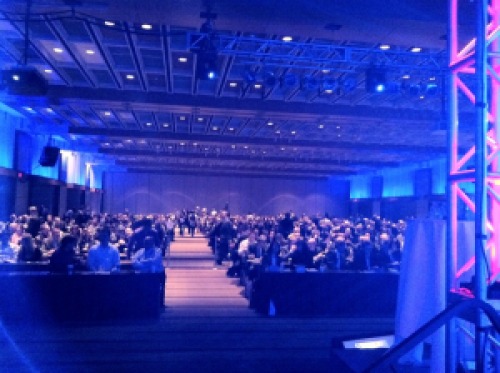More than once I have stood at the very edge of a precipice before a grand vista, and each time has given me an unforgettable experience. The Grand Canyon, Yosemite’s Half Dome and the top of the Eiffel Tower can all thrill me like nothing else. Or they can terrify me, setting my knees aquiver, causing me keep back from the edge and leaving the most breathtaking moment out of reach. Those venues have a visceral power to inspire and frighten, and I can’t predict in advance which power will dominate on a given day.
I used to think that such double-edged power was limited to dramatic physical contexts like cliffs and summits, but at a conference in Toronto in November 2010, it happened to me in business. This was the picture of the precipice:
Yeah, big crowd. Huge, even.
The backstage folks also got all weird last minute about all my jewelry — that it was going to interfere with the microphones. So my earrings, necklace, etc all went off. Taking off a woman’s jewelry is like taking off Wonder Woman’s magical bracelets. Not something to be done, in my opinion.
I felt a little bare. And then, suddenly self-conscious. In an instant, I realized that I was not entirely “on my game.” A little voice in my head added “what if I use a bad word here (which, as you know, I am apt to do); 2000 people will remember it”. I’m sure I had some thought about this being Canadians and politeness mattering. Oy. “Be careful,” the little voice said. You know what happened next, right? The figurative Step Back.
And that, as it turns out, was exactly the opposite of what was needed.
Our natural selves – our identities without titles, our credentials without posturing, our perspectives built on experience and learning – are unique. That scares many of us because it means we don’t necessarily fit in, and “not fitting in” is perilously close to “not belonging.” But it our uniqueness is we need to bring forward. Not what someone else could expect, but the best and authentic part of ourselves. We recognize the need for companies and products to be differentiated, but find it unsettling to think of exposing our natural and positive differentiators.
I got caught in that little twist backstage in Toronto. I subconsciously chose “safety” in the few seconds before walking on. When you’re in a big room, with a big crowd, you need to be incrementally bigger than when you’re in a small venue. But the voice, posture and animation that I showed up with was, instead, ever-so-slightly muted. I did fine, but not amazing. Martin Perelmuter of the wonderful Speaker’s Spotlight bureau told me later that while I am normally animated and vivacious in person, he has sometimes seen me dialed down when on stage. As in, charisma turned down. It’s a speaker’s version of being “appropriate” or “nice”. It’s also “low maintenance.” The audience may decide that now is a good time to check email and they might even tweet me up (which they did at The Art of Management) but they aren’t engaged by both heart and mind.
I don’t want to turn down my volume or voice in any way because I’m afraid of being seen as I am. And, I won’t do it anymore. I hope you won’t either in whatever work you do. The key is to remember that by turning down our volume, our aliveness, our animation, we’ll be LESS of who we actually are. And that’s not what we’re here in life to do. It doesn’t serve us, it doesn’t serve our audience or coworkers, it doesn’t serve our mission, and it doesn’t serve the economy. Perhaps, most importantly, it doesn’t bring us joy.
You can see me at this more recent TEDx talk done in late March on innovation where I brought this new intention with me as I walked to the precipice.
Wow, now that’s a kick-ass view.




Kick-ass post and personal story, Nilofer 🙂 It resonates with what I shared about women’s speeches and the search for our own voice, ourselves. I also like your sense of turning up or down charisma (what I called our personal rheostat).Turn it on, Nilofer, you rock! (and the frozen picture is so funny!!!)
Thanks so much for the support. It took me several months (and doing a better talk) to get me to share the “failure” of stepping back from the precipice.